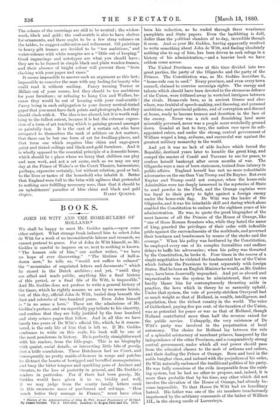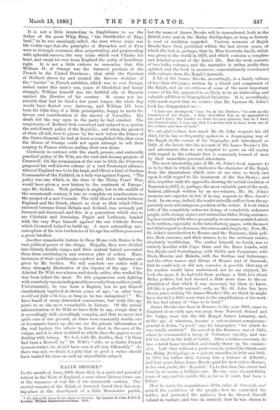BOOKS.
JOHN DE WITT AND THE HOME-RULERS OF HOLLAND.*
WE shall be happy to meet Mr. Geddes again,—upon some other subject. What strange freak induced him to select John de Witt for a work of no inconsiderable labour and research, we cannot pretend to guess. For of John de Witt himself, as Mr. Geddes is careful to impress on us, next to nothing is known. " The human side of him," our -author writes, " we have no hope of ever discovering." "'The lifetime of half-a- dozen men," he tells us, " would not suffice to exhaust" the " mountains of unprinted letters and documents " which lie stored in the Dutch archives ; and yet, " until they are sifted and made public, anything like a final history of this period, or a final life of De Witt, is impossible." And Mr. Geddes does not profess to write a general history of the times, which he rightly assures us are by no means heroic, but of this dry, official John de Witt, buried deep beneath the dust and cobwebs of two hundred years. Even John himself is " in no sense a hero." These are the admissions of Mr. Geddes's preface, and we regretfully pay tribute to his sincerity, and confess that they are fully justified by the four hundred and sixty octavo pages that follow. And in all this we have barely two years of De Witt's official life, which, be it remem- bered, is the only life of him that is left us. If Mr. Geddes continues to write on this scale, his book will be one of the most ponderous in history. He is perfectly straightforward with his readers, from the title-page. This is no biography with quaint, social details, or interesting little bits of gossip, just a trifle scandalous. These Dutchmen had no Court, and consequently no pretty maids-of-honour in rouge and patches to distract the hearts of bewigged and beruffied mousquetaires, and busy the bitter tongues and sparkling pens of Arsinoe and Orontes, to the loss of posterity in general, and Mr. Geddes's readers in particular. For if there had been gossip, Mr. Geddes would have given it to us, briskly and well, if we may judge from the scanty family letters sunk iu this enormous mass of parchment and red-tape. " How much better they manage in France," must have often
• History of the Administration of John De Witt, Grand Pensionary of Holland.
By James lieddes. Vol. 1. 1529-1654. London: C. Kogan Paul and Co. 1879.
been his reflection, as he waded through these wearisome pamphlets and State papers. Even the backbiting is dull, duller than the political slanders of to-day, incredible though it seem. And so poor Mr. Geddes, having apparently resolved_ to write something about John de Witt, and finding absolutely nothing else to say of him, has been driven to seek refuge in a history of his administration,—and a heavier book we have seldom come across.
The United Provinces were at this time divided into two- great parties, the party of the Oligarchs and the party of the Princes. The Constitution was, as Mr. Geddes describes it,. "home-rule run to seed." Every province, and even every town council, claimed to exercise sovereign rights. The energy and talents which should have been devoted to the strenuous defence of the Union, were frittered away in wretched intrigues between the rivals. Home-rule here, as in ancient Greece and else- where, was fruitful of speech-making, and finessing, and personal ambitions, and provincial policies, and of corruption and discord at home, ready to become treason and desertion in the face of the enemy. Never was a rich and flourishing land more miserably governed, never was a people more wretchedly ground down. Goaded at last to fury, the nation rose upon its self- appointed rulers, and under the strong, central government of William waged a long, arduous, and successful war against the greatest military monarchy in the world.
And yet it was no lack of able leaders which forced the Republic, destined years later to humble the great king, and compel the master of Conde and Turenne to sue for peace, to confess herself bankrupt after seven months of war. The Oligarchs were a race of born statesmen, trained from infancy in public affairs. England herself has met no more redoubtable adversaries on the sea than Van Tromp and De Ruyter. But even Ruyter and Tromp could not conquer, when the home-rule Admiralties were too deeply immersed in the mysteries of State- to send powder to the Fleet, and the Orange captains were too loyal to their party to fight against a foreign enemy under the home-rule flag. De Witt was the leader of the Oligarchs, and it was his inimitable skill and daring which alone enabled the Constitution to endure for the eighteen years of his administration. He was, to quote the great biographer of the most famous of all the Princes of the House of Orange, like " one of those Roman Senators who, while they hated the name of king, guarded the privileges of their order with inflexible pride against the encroachments of the multitude, and governed their bondmen and bondwomen by means of the stocks and the- scourge." When his policy was furthered by the Constitution, he employed every one of its complex formalities and endless delays to baffle his adversaries ; when his policy was thwarted by the Constitution, he broke it. Four times in the course of a single negotiation he violated the fundamental law of the Union which forbade the Provinces to treat separately with foreign States. Had he been an English Minister he would, as Mr. Geddes says, have been deservedly impeached. And yet so absurd and. impracticable was the system he administered, that we can hardly blame him for contemptuously thrusting aside in practice, the laws which in theory he so earnestly upheld. Under that system, the vote of poverty-stricken Overyssel had as much weight as that of Holland, in wealth, intelligence, and population, then the richest country in the world. The voice of Gelderland, paying five per cent. of the taxation of the Union,. was as potential for peace or war as that of Holland, though Holland contributed more than half the revenue raised for the public service. Unhappily, the very existence of De Witt's party was involved in the perpetuation of local autonomy. The choice for Holland lay between the rule of a splendid aristocracy of merchant princes, hampered by the independence of the other Provinces, and a comparatively strong central government, under which all real power should pass from the educated classes to the mob of artisans and sailors, and their darling the Prince of Orange. Born and bred in the- noble burgher class, and imbued with the prejudices of his order, De Witt naturally embraced the traditional politics of his party. He was fully conscious of the evils inseparable from the exist- ing system, but he had no other to propose, and, indeed, it is more than probable that by his time, any other which did not involve the elevation of the House of Orange, had already be- come impossible. To that House De Witt had an hereditary hatred. His father was one of the six members treacherously imprisoned by the arbitrary commands of the father of William III., in the strong castle of Loevesteyn. It is not a little interesting to Englishmen to see the father of the great Whig King, " the Stadtholder of Eng-, land," as he was sneeringly called, the man whose reign was the visible sign that the principles of Hampden and of Pym were to triumph evermore, thus perpetrating, and perpetrating with splendid success, the very crime which cost Charles his head, and swept for ever from England the party of hereditary right. It is not a little curious to remember that this William II. of Orange was the warmest partisan of the French in the United Provinces ; that while the Province of Holland strove for and created the famous doctrine of the " barrier" to French ambition, which was to cost Europe, united under this man's son, years of bloodshed and heroic struggle, William himself was the faithful ally of Mazarin against the liberties of his country. It seems not im- possible that had he lived a few years longer, the white flag would have floated over Antwerp, and William III. been born the little king of a little principality, happy to merit the favour and consideration of the master of Versailles. His death left the way open to the party he had crushed. The magistrates of Holland first conceived and reduced to a system the anti-French policy of the Republic ; and when the greatest of them all fell, torn to pieces by the mob before the Palace of the States-General, he had at least accomplished this, that even the House of Orange could not again attempt to sell their country to France without sealing their own doom.
Curiously in contrast with the small, prosaic, and eminently practical policy of De Witt, are the vast and dreamy projects of Cromwell. On the termination of the war in 1653, the Protector proposed his well-known scheme of a vast Protestant alliance, whereof England was to be the head, and Oliver a kind of Puritan Commander of the Faithful, in a holy war against Popery. " The policy was one which, in the time of the Thirty Years' War, would have given a new history to the continent of Europe,' says Mr. Geddes. Well, perhaps it might, but in the middle of the seventeenth century it was as complete an anachronism as the project of a new Crusade. The wild idea of a union between England and the Dutch, almost as close as that which Oliver enforced between Great Britain and Ireland, was seriously put forward and discussed, and this in a generation which was to see Calvinist and Arminian, Papist and Lutheran, banded with the very Pope himself against the one Catholic Power which Cromwell helped to build up. A more astounding mis- conception of the true tendencies of his age has seldom possessed a great intellect.
Another remarkable feature in these Home-rule States is the vast political power of the clergy. Happily, they were divided into bitterly hostile camps, and their mutual hatred prevented them from combining in any common plan of action. Many instances of their meddlesome conduct and their influence are given by Mr. Geddes. We will conclude our notice with a story strangely illustrative of the bigotry of the age. Vice- Admiral De Witt was a brave and sturdy sailor, who worked his way from before the mast. To this pugnacious soul, fighting with somebody was an indispensable necessity from earliest youth. Unfortunately, he was born a Baptist, but he got himself clandestinely baptised at eleven years of age, " as other boys would not fight with hint, so long as he was uubaptised ! " We have heard of many interested conversions, but truly this ap- pears to us the most remarkable in history. Of the actual administration of De Witt we have little to say, except that it is exceedingly dull, exceedingly complex, and that we never feel quite sure of our ground, as there were constantly double sets of documents drawn up, the one for the private information of the real leaders, the others to throw dust in the eyes of the vulgar, and it is often doubtful to which class the papers we are dealing with belong. We feel, with Mr. Geddes, that " if there
had been a Boswell by" De Witt's "side, or a chatty French memoir-writer, we should have seen it all very differently." As there was not, we think it a pity that so good a writer should have wasted his time on such an unprofitable subject.



































 Previous page
Previous page